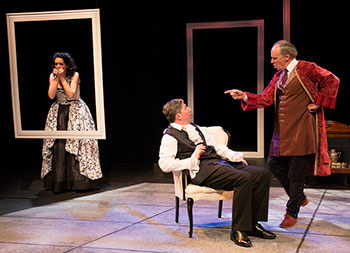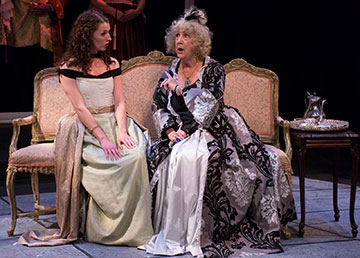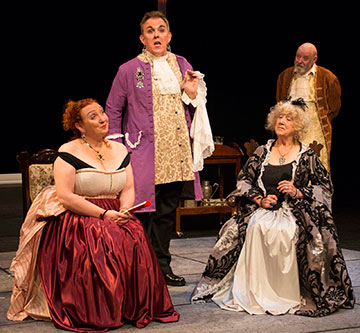
Credit: Nancy Caldwell
At Jericho Arts Centre until September 28, 2014
604-224-8007/www.unitedplayers.com
Posted September 15, 2014
Directed and designed by Matthew Bissett for United Players, The School for Scandal is one of the handsomest productions mounted at the Jericho Arts Centre and it proves once again: less is often more. A couple of dainty period furniture pieces, a writing table and seven very large empty gilt frames elegantly lit by lighting designer Graham Ockley.
The play begins beautifully: all the characters, in period costumes, step into the frames – some singly, some in groups – and the lights come up on each frame in turn. So pretty a ‘gallery’ it is, that there was some spontaneous applause the night I saw the show. And then the play, written by Richard Brinsley Sheridan in 1777, begins.
The School for Scandal must have been an oddity in its day: inspired by the ribald Restoration comedies of almost a hundred years earlier but out of step with the so-called Sentimental comedies of its own time, The School for Scandal foreshadows the plays of Oscar Wilde with their amorality and clever repartee.
Bissett’s director’s notes are well worth reading (at unitedplayers.com) in which he draws the parallels between the power of media – then and now – to affect our lives. In the 18th century, print media included ‘gossip’ in its coverage. Bissett projects headlines above the stage as the play progresses to keep us up to date on the latest juicy tidbits. Today, we have Facebook and Twitter. But either way, our attitudes can be shaped by what we’re saying about each other or what’s being said about us. In The School for Scandal, the gossipmongers, chief amongst them Lady Sneerwell (Joan Koebel), hold London in their tattle-telling grip.

Credit: Nancy Caldwell
A convoluted plot, it pays to keep your wits about you: rich, old Sir Peter Teazle (Linden Banks) has recently married a much younger, previously guileless country girl. But once married, Lady Teazle (Caitlin Clugston), who only married Sir Peter for his money and who harbored hopes of being made a rich widow quite quickly, becomes a terrible spendthrift. Worse, she falls into the habit of gossiping with a notorious bunch of tattlers. There are various wards of Sir Peter and other hangers-on to mix things up but the intrigues really ramp up when Sir Peter’s old friend Sir Oliver (Paul Kloegman) turns up.
It’s all very silly and it goes on too long. Once all the plots are revealed, we just want it to wrap up quickly.
Two directorial choices are questionable: firstly, the ‘gaying up’ of Sir Benjamin Backbite (Bruce Hill). We get it that Backbite’s a nitwit and a dandy but must he also appear to be a clichéd homosexual? And secondly, there’s a fine line between a n’er do well who’s redeemable and one who’s a good-for-nothing swaggerer. Bissett might have helped Matt Loop find that delicate balance in the character of Charles Surface.
However, Bissett shows real inspiration in the scene in which good-for-nothing Charles sells off the family portraits in order to pay off debts incurred by drinking and idleness. Stepping into those frames once again – but with a wig here, a couple of mustaches there – the characters appear to be Charles’s illustrious ancestors. Beautifully executed.
Costume designer Catherine E. Carr’s finest costumes are Lady Teazle’s b/w gown and plumed hat and the flouncy b/w gown on Lady Sneerwell. Sound design by Neil Griffiths is an interesting combination of classical music that, on occasion, is ‘rocked’ up.
But what keeps us really engaged over two and a half hours is a trio of very fine performances: Linden Banks as hapless, lovelorn Sir Peter; Michael Wild as Sir Peter’s plotting, two-faced ward Joseph Surface; and especially Caitlin Clugston as Lady Teazle. She absolutely sparkles and has terrific comedic flair for pouting and plotting her character’s way to wealthy widowhood. Clugston provides the bubbly for this United Players’ season opener.

Credit: Nancy Caldwell

